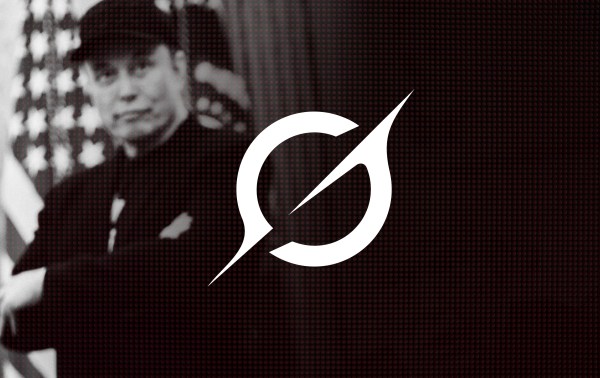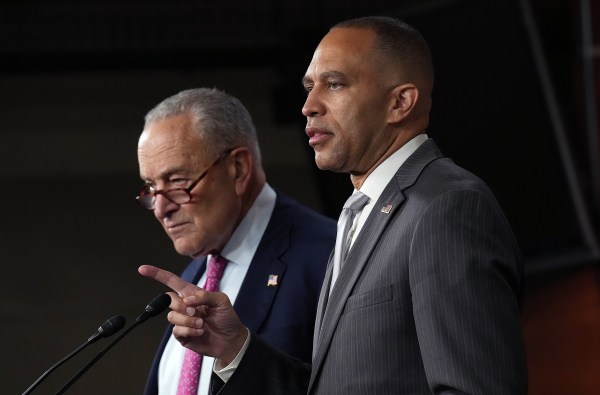Hey,
Is America an idea or a nation? Let me cut to the chase and answer the question: Yes. (Also acceptable: “It depends,” “Sometimes yes, sometimes no,” and “Shut up.”)
I don’t like this “debate” because—as the scare quotes suggest—it usually isn’t a debate. In fact, most false binaries make for pretty tedious debates once you recognize that they’re false binaries.
Nature versus nurture is probably the most obvious one. And again, the answer is “Yes.” But that doesn’t mean in every regard. Your eye color, blood type, and number of fingers: These are all nature (absent some weird, probably criminal, interventions). Nobody says, “We’re raising Timmy to be O-positive.” Well, nobody sane. What language you speak, your religion (at least at first), and knowledge of the rules for baseball, card games, good manners, Odd Couple trivia, etc., are all pretty much straight-up nurture.
Meanwhile, some things that seem like they should be all nature are both, like your height. How tall you end up depends in part on your genetic blueprint, but also on things like nutrition and physical activity and stress (which can affect how and when you get the right hormonal cocktails). North Koreans are on average shorter than South Koreans, and that isn’t because of genetics. The Japanese have been getting taller since World War II. IQ is needlessly controversial, but suffice it to say it’s a lot more nature than Team Nurture wants it to be and yet more nurture than some Team Nature folks are willing to concede.
But there are other false binaries. Mind versus body, free will versus determinism, tastes great versus less filling: We can debate these things all day long. But any serious consensus would allow that it’s both/and in many respects and either/or in a few.
Which brings me back to the “debate” over whether America is an idea or a nation—and those scare quotes. In my experience most—but not all—the people most adamant that America is a nation and not an idea—or vice versa—just want to fight with strawmen.
As a non-paying reader, you are receiving a truncated version of The G-File. You can read Jonah’s full newsletter by becoming a member here.
Sometimes they’ll invoke this either/or framing for narrow policy arguments that can stand on their own without reference to this debate. For instance, my dear friend Ramesh Ponnuru gets dragged into this debate from time to time in order to push back against people like Sen. Lindsey Graham (or at least Lindsey Graham version 1.0 or 1.5) who insist their immigration policy is right because America is an “idea.” Graham would be better off making the argument for his immigration policy without rooting it in America as an idea.
While I agree with much of what Ramesh says on this subject—and most others—his argument illustrates another frustrating thing about this topic. He concedes that it’s a both/and thing. He writes: “America isn’t a race. But it’s not an idea either. It is, rather, a nation. It is a nation whose identity is more bound up with political ideals than most nations: ideals such as equality before the law, self-government, and freedom of religion. But those ideals are part of a national culture that is not reducible to them.” I agree! But the reverse is also true. America is a nation that was founded on ideas, and thus America cannot simply be reduced to nationhood.
Vance’s America—and Americans.
I bring this up because J.D. Vance is staking out the position that he opposes sinister forces who claim, “America is just an idea.” This might be a fair shot at, say, Joe Biden, who frequently said “America is an idea” as a way to disparage his political opponents in precisely the ways that annoy me.
Again, Vance concedes that it’s a both/and thing, but he denies that his opponents are capable of such nuance. Here’s how he put it in his Republican National Convention acceptance speech:
You know, one of the things that you hear people say sometimes is that America is an idea. And to be clear, America was indeed founded on brilliant ideas, like the rule of law and religious liberty. Things written into the fabric of our Constitution and our nation. But America is not just an idea. It is a group of people with a shared history and a common future. It is, in short, a nation.
And here he is earlier this month, accepting an award from the Claremont Institute:
I’d also say that citizenship in the 21st century necessarily means building. Because America is not just an idea, we’re a particular place with a particular people and a particular set of beliefs and way of life.
Again, I don’t think I’ve ever met a serious person who doesn’t actually believe America is both a nation and an idea, or a nation uniquely and importantly founded on ideas. We are not, as some like to claim, the only nation founded on an idea. Israel was. The Soviet Union was. The French re-found themselves on ideas every few decades. But G.K. Chesterton was on to something real when he said, “America is the only nation in the world that is founded on a creed.” He went on to note that “England is English as France is French or Ireland Irish,” but being American is creedal. Which is what he was getting at when he said America has the “soul of a church” precisely because Americanness is a created thing, a new thing, as much as it is an organic one. The Founders, after all, proclaimed that they were establishing a “new order for the ages” (Novus ordo seclorum), which, by the way, is inscribed on the Great Seal of the United States.
Chesterton writes:
America invites all men to become citizens; but it implies the dogma that there is such a thing as citizenship. Only, so far as its primary ideal is concerned, its exclusiveness is religious because it is not racial. The missionary can condemn a cannibal, precisely because he cannot condemn a Sandwich Islander. And in something of the same spirit the American may exclude a polygamist, precisely because he cannot exclude a Turk.
Now, America has lost some of the qualities Chesterton saw when he visited America, but I think the framing is still more right than wrong. The American identity is bound up in an idea of what America is about in a way that “normal” nations aren’t. France can become (more) socialist or capitalist, or Catholic, or secular, but it would remain French in a way that America wouldn’t if it overthrew our constitutional structure.
In his Claremont speech, Vance rejects the creedal understanding of America in part because lots of non-Americans—“hundreds of millions, maybe billions of foreign citizens”— agree with the principles of the Declaration of Independence. He goes on: “Must we admit all of them tomorrow? If you follow that logic of America as a purely creedal nation, America purely as an idea, that is where it would lead you.”
Vance is pulling a Graham in reverse. While Graham used “America as an idea” to push for a policy outcome on immigration, Vance is using a scary immigration outcome to denigrate the notion America is an idea.
But Vance is wrong, too. You can believe in all of the tenets of the Freemasons, but that doesn’t mean the Freemasons have to accept you. You can be a Marine in your heart, but if you don’t pass the physical or the background check, you’re not getting in (the Marines do not admit people with no arms, no matter how committed they are to the ideals of the Corps). Sadly, people tell me all the time that they’d like to work for The Dispatch because they believe passionately in what we’re doing. Alas, we can’t hire them all. Dave Chappelle’s black Klansman character wouldn’t be admitted to the Ku Klux Klan. I’m not comparing America, the Marines, or The Dispatch to the Klan; I’m just saying that all manner of institutions can make prudential judgments about who gets to be a member of them, including nation-states. I suspect that if there were 2 billion Jews in the world, Israel would amend its policy of being a home to Jews. Then again, if there were 2 billion Jews in the world, that policy wouldn’t have been necessary in the first place.
Vance goes on to stack another strawman atop the first. He says that accepting the creedal understanding of America would lead to us rejecting “a lot of people that the [Anti-Defamation League] would label as domestic extremists. Even those very Americans had their ancestors fight in the Revolutionary War and the Civil War. And I happen to think that it’s absurd, and the modern left seems dedicated to doing this, to saying, you don’t belong in America unless you agree with progressive liberalism in 2025. I think the people whose ancestors fought in the Civil War have a hell of a lot more claim over America than the people who say they don’t belong.”
There’s a great deal to unpack here. For starters, I’m not for revoking the citizenship of people the ADL calls “domestic extremists,” even when the ADL is right about them being domestic extremists (sometimes the ADL is correct about such designations, after all). But I also am not in favor of saying that domestic extremists—real or alleged—have some greater “claim over America” than the ADL or any other group simply because their ancestors fought in the Civil War.
Indeed, I’d say that framing is un-American. If your ancestors fought in the Civil War, I might find that interesting or admirable in some cultural or historical sense. But I don’t feel any obligation whatsoever to defer to you on anything because of it. If you say, “We shouldn’t help Ukraine. And I’m saying that as someone whose great-great-grandfather fought for the Union,” I’d probably respond, I couldn’t care less about that. Except I’d be wrong. Because if you tell me that your great-great-grandfather fought for the Confederacy, I would care even less about your opinion.
Remarkably, Vance makes no distinction between “ancestors” who fought to save the Union and ones who fought to tear it asunder (in an effort to defend slavery!). All he cares about is whether you had (presumably white) ancestors who existed at the time and fought for … something.
I’m not here to relitigate the Civil War, but I think the right side won. Moreover, invoking long-dead relatives on the wrong side of that war doesn’t carry an enormous amount of moral weight with me. I will also note that Abraham Lincoln—the first Republican president, by the way—believed that America was founded on an idea. That was his point in the Gettysburg Address when he said, America was “conceived in liberty and dedicated to the proposition that all men are created equal.”
Is Vance’s wife, the child of immigrants to the U.S., less of an American, with less of a “claim over America” and its promise, than he is? My mom’s family goes back to colonial America. My dad’s to the late 19th century. Someone will have to help me with the math on how much of America I can “claim”—whatever the hell “claiming” even means here.
What I find particularly un-American is Vance’s backdoor attempt to smuggle in European ideas about aristocracy into the American political discourse (which my wife wrote about here). Before the 16th century, virtually all European aristocrats were essentially descendants of warlords (or claimed to be). The nobility of the sword (noblesse d’épée) dominated Europe’s elites until monarchs started selling titles of nobility to “jumped-up” aristocrats who attained their stations by purchasing government or church appointments. Noblesse de robe (nobles of the robe) were despised by the noblesse d’épée. This points at why I’ve long argued that the concept of aristocracy is the oldest form of identity politics. It holds that simply by accident of birth, some people are more, or less, worthy, noble, entitled than other people.
Vance is arguing for a kind of cultural nobility of the sword. It doesn’t matter what descendants of patriotic warriors do or say, they have extra clout and extra “claim” to America, simply because their ancestors fought—even for the Confederacy.
I say cultural, because even though he’s the vice president of the United States, he hasn’t figured out how to translate this directly to public policy. But the cultural argument does seem intended to provide leverage for a bunch of public policy stuff, particularly immigration and birthright citizenship. The “elites”—J.D. Vance is an elite too—he dislikes aren’t rooted in America the way he is. They don’t have family burial plots in eastern Kentucky like he does. They prattle on about America as an idea and call goons who stormed the Capitol to steal an election and violate the Constitution “extremists.”
His kind of people “would fight and die to protect this country,” Vance explained in his vice presidential acceptance speech. “Now that’s not just an idea, my friends. That’s not just a set of principles. Even though the ideas and the principles are great, that is a homeland. That is our homeland. People will not fight for abstractions, but they will fight for their home.”
I agree that people will fight for their homeland. But who says Americans—never mind “people”—won’t fight and die for abstractions? The Americans who founded this country did. What were all those wars of religion, the Crusades, the Bolshevik Revolution, if not at least in part fights over abstractions? Vance, with the help of his preferred intellectuals, is setting up a strawman army of anti-American rootless cosmopolitans in order to claim real Americanness for his tribe and no other.
As a Marine, Vance served honorably as a press officer in a combat zone. That means he took two oaths, both of which involve swearing to defend not “the homeland” but the Constitution. I don’t know if I’d call the Constitution an abstraction—it’s more of a user manual (and the Declaration is more like a mission statement). But the Constitution is meaningless without the ideas—or abstractions—that give it weight and meaning.
That’s why the Americans who survived the fighting to create this country abolished titles of nobility. They were imbued and inspired by the idea that in this new kind of nation, equality before the law would define us, not inherited status or privilege. We failed to live up to that ideal, which was Lincoln’s point at Gettysburg (and Martin Luther King Jr.’s at the Lincoln Memorial a century later). But that ideal remains at the heart of what it means to be an American. The fact that this ideal is part of our culture and national identity—our “nationness”—doesn’t change or undermine that; it strengthens it and is central to what makes America great.











Please note that we at The Dispatch hold ourselves, our work, and our commenters to a higher standard than other places on the internet. We welcome comments that foster genuine debate or discussion—including comments critical of us or our work—but responses that include ad hominem attacks on fellow Dispatch members or are intended to stoke fear and anger may be moderated.
With your membership, you only have the ability to comment on The Morning Dispatch articles. Consider upgrading to join the conversation everywhere.